 An experimental GlaxoSmithKline drug, designed to fight heart disease in a new way, failed to meet its main goal in a major late-stage clinical study, dealing a blow to one of the company's biggest new treatment hopes.
An experimental GlaxoSmithKline drug, designed to fight heart disease in a new way, failed to meet its main goal in a major late-stage clinical study, dealing a blow to one of the company's biggest new treatment hopes.
Darapladib's inability to reduce the risk of heart attacks and strokes in the first of two big Phase III clinical studies is disappointing, but not a huge surprise. Many analysts already had low expectations for the project.
The once-daily pill did produce greater reductions in serious coronary events in some of the pre-defined secondary end points of the trial, which GSK said required more analysis.
Darapladib is designed to prevent heart attacks and strokes in a completely different way from cholesterol-lowering drugs by targeting an enzyme called Lp-PLA2 that is linked to artery-clogging plaques.
While some industry analysts have suggested it could become a $10 billion-a-year seller, if it works, few have pencilled insignificant sales forecasts so far, given uncertainty about the product.
Current consensus forecasts point to annual sales of only $605 million in 2018, according to Thomson Reuters Pharma.
Patrick Vallance, GSK's head of pharmaceuticals R&D, said Britain's biggest drugmaker would continue to investigate the role of Lp-PLA2 inhibition in coronary heart disease and other conditions, while also poring over the latest trial results.
"We will now work to better understand the data, including evaluation of the patient sub-groups, and await the outcome of a second Phase III study of darapladib in acute coronary syndrome," he said.
 The first trial, known as STABILITY, enrolled nearly 16,000 patients with coronary heart disease in 39 countries and measured the differences in outcomes between giving them darapladib or a placebo pill.
The first trial, known as STABILITY, enrolled nearly 16,000 patients with coronary heart disease in 39 countries and measured the differences in outcomes between giving them darapladib or a placebo pill.
A second 13,000-patient study, called SOLID-TIMI 52, is due to complete in March 2014 and is looking at patients who have already suffered an acute coronary event. It will assess if darapladib can prevent a secondary attack.
Some medical experts believe darapladib may have a better chance of success in the second study.
GSK has had some notable successes with its new drugs this year, including approvals of new medicines for cancer, lung disease and HIV. But it also had disappointing clinical results with another high-risk product in September, its MAGE-A3 cancer vaccine for melanoma.

No comments:
Post a Comment